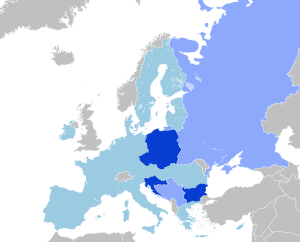Euro-Slavism
Euro-Slavism, also spelled Euroslavism, is a political concept that evolved from pan-Slavism. It aims to solve problems of Slavic peoples within the European Union. Euroslavists promote cooperation and unity among Slavic peoples, which can be achieved through European integration.[1][2]

It shaped from a branch of a larger and older pan-Slavism ideology. Euroslavism is considered to be a modern form of the Austro-Slavism and neo-Slavism movements.[3][4]
History
Its origins came in the middle of the 19th century. First proposed by Czech liberal politician Karel Havlíček Borovský in 1846 as Austro-Slavism, it was refined into a provisional political program by Czech politician František Palacký and completed by the first President of Czechoslovakia Tomáš Garrigue Masaryk in his work New Europe: Slavic Viewpoint.[5]
Characteristics
Euroslavists promote cooperation among Slavs on equal terms in order to resist dominant forces positions. Movement is also to some extent call to resist strong multicultural tendencies from Western Europe and requests within the EU to avoid the dominant position of Germany. Euroslavism opposes Slavophilia. Typical is strong encouragement of democracy and democratic values. Their view is that every state has the right to decide whether to become a member of the European Union. They oppose the exclusion of Russia from the European cultural area.[6] In the longer term, they believe it possible to create a united Slavic community without Russian dominance.[1]
See also
- Pan-Slavism
- Austro-Slavism
- Neo-Slavism
- Slavic Europe
References
- Wagner, Lukas (2009), The EU's Russian Roulette (PDF), Tampere: University of Tampere, pp. 74–78, 85–90, retrieved 19 March 2017
- Morávek, Štefan (2007). Patriotizmus a šovinizmus (PDF) (in Slovak). Bratislava: Government Office of the Slovak Republic. p. 97. ISBN 978-80-88707-99-8. Retrieved 19 March 2017.
- Magcosi, Robert; Pop, Ivan, eds. (2002), "Austro-Slavism", Encyclopedia of Rusyn History and Culture, Toronto: University of Toronto Press, pp. 21, ISBN 0-8020-3566-3
- Mikulášek, Alexej (2014). "Ke koexistenci slovanských a židovských kultur" (in Czech). Union of Czech Writers. Retrieved 19 March 2017.
- Masaryk, Tomáš G. (2016). Nová Evropa: stanovisko slovanské (in Czech) (5 ed.). Prague: Ústav T.G. Masaryka. ISBN 978-80-86142-55-5.
- Lukeš, Igor (1996). Czechoslovakia between Stalin and Hitler. New York: Oxford University Press. p. 5. ISBN 0-19-510266-5.
| Wikimedia Commons has media related to Pan-Slavism. |
.svg.png)